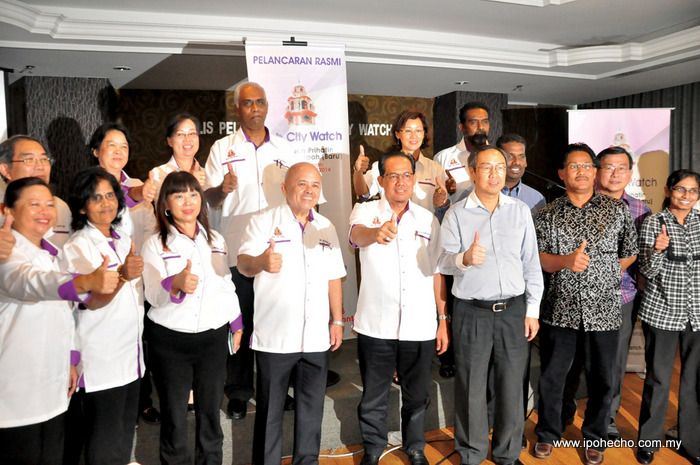Keeping Watch on Ipoh


By Fathol Zaman Bukhari
I was once asked what really started Ipoh City Watch (ICW). I had the answer but took a while to ponder on the likely reasons for the establishment of this non-governmental organisation.
The new millennium had just descended on Ipoh and talks were rife that the city’s boundary would be extended to include areas which were not under the city council’s jurisdiction.
Chemor, Gopeng, Jelapang and Meru were some of those considered. From an erstwhile 400-odd sq km the city would be expanded to its current 643 sq km to support a population in excess of 600,000.
The expansion was welcomed by the city’s business community, as it would provide better opportunities for business to flourish. However, residents were rather sceptical fearing a dilution in Ipoh City Council’s responsibilities with a larger area to cover.
Topping the list was cleanliness, as Ipoh in the 1950s right until the 1970s, was the cleanness town in the country. This distinction was attributable to the Seenivasagam brothers who took pride in making the state capital squeaky clean, both in looks and in governance, to the chagrin of other municipal councils who were in deep slumber, oblivious of the changing times.
Developments taking place in and around Ipoh seemed unstoppable, driven by an irresistible urge to spread. Some of which were never in the city’s 5-year structural plan, prompting residents to suspect a hidden agenda.
One very noticeable change taking place was on the vacant lot adjacent to Kinta City along Jalan Sultan Azlan Shah (formerly Jalan Tasek). Although the space was earmarked for a permanent structure, the construction of an entertainment outlet was puzzling, to say the least.
Bali Bali, a night club cum karaoke joint, took shape and it changed Ipoh Garden for good. The club stood where the De Garden shopping mall now stands. Ipoh City Council could not give a reasonable answer why approval was given for its construction. When the entertainment centre began operation in early 2001, people living in the vicinity protested as the din created caused them many sleepless nights.
A group of disgruntled residents, led by a lawyer, whose house was a stone’s throw away from the club, decided to take matters in their hands. A formal complaint was lodged with Ipoh City Council and a meeting with then Mayor Dato’ Taalat Hj Husain was arranged.
Lawyer Ernest Balasingam’s perseverance prevailed. The ‘seedy’ Bali Bali night club was demolished much to the delight of the public. Ernest had alluded to the council’s by-laws on entertainment outlets to strengthen his case.
The fact that the Council backed down after owning its mistake, spurred Ipohites to go beyond illegal buildings and noise pollution. They planned on something larger – a platform to be their sounding board against an insensitive Council prone to making contradictory decisions and statements at the behest of Ipohites.
That was how the idea behind the formation of Ipoh City Watch came into existence. A gathering of like-minded people was called and sometime in late November 2002, the first meeting took place at YMCA Ipoh hall. I was among the 11 who turned up. Bobby Yin was elected president while the rest made up the committee.
We adopted a confrontational approach in dealing with problems affecting Ipohites. I remember making calls on the mayor, the council secretary and department heads to voice residents’ dissatisfactions. And when that did not work we tried drawing the attention of the Mentri Besar and the Executive Councillor for Local Government.
When that too did not work we sought the press for assistance. The Sun was kind enough to provide us with a weekly column to vent our frustrations. And the rest is history not worth mentioning. Over the years the fire in us dissipated leaving a void never to be filled until recently.
When the society was de-registered in 2013 by the Registrar of Societies for non-submission of its accounts, I thought that was the end of ICW. But circumstances were to prove me wrong. It was re-registered in April 2014 with a new team at the helm.
Today under a very dynamic president, Associate Professor Dr Richard Ng, Ipoh City Watch is set to make waves. The society was re-launched during a simple ceremony held at Kinta Riverfront Hotel, Ipoh on Friday, January 23.
Richard’s conciliatory style seems to work. His “3 Es” principle – Engage, Explain and Educate could be the panacea. At last count there are nearly 60 highly-motivated individuals in Richard’s WhatsApp group, “ICW Watchaa”. And that includes some notable names such as Gerakan’s former chief Chan Ko Youn, former mayor Roshidi Hashim, academician Victor Chew and even Opposition lawmakers, Howard Lee and Wong Kah Woh. My phone hasn’t stopped vibrating and squeaking ever since I was roped into the group.


